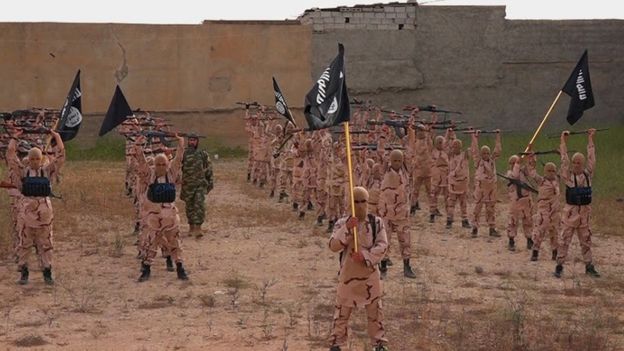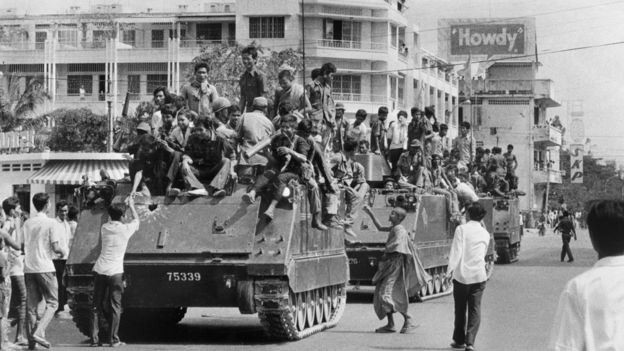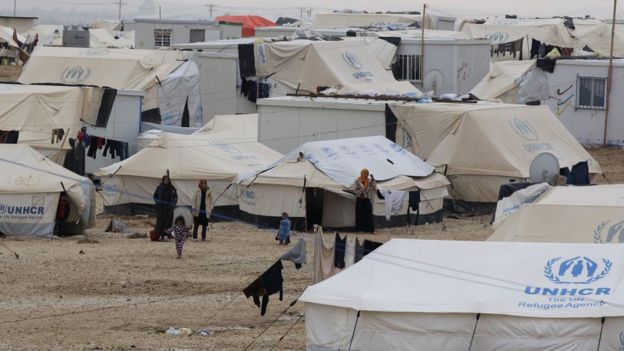
France's first air strike targeting Islamic State (IS) in Syria is reported to have killed 12 children recruited by the jihadist group.
Their
deaths have highlighted how the young populations of Syria and Iraq are
being moulded into a new generation of militants, writes Jessica Stern.
In July 2015, IS released a video of what is believed to be the group's first recorded beheading by a child soldier. Children have also reportedly been instructed by IS militants to shoot captives.
The Syrian Observatory for Human Rights said in July 2015 that IS had used as many as 19 children as suicide bombers. The report announced that at least 52 children under the age of 16 had died fighting for IS so far in 2015.
Residents of Raqqa told Syria Deeply that children were taught in ISIS training camps how to behead another human being, and were given blonde dolls on which to practise.
One child told Human Rights Watch: "When [IS] came to my town... I liked what they are wearing, they were like one herd. They had a lot of weapons. So I spoke to them, and decided to go to their training camp in Kafr Hamra in Aleppo."
He attended the camp when he was 16 years old, but the leader told him he preferred younger trainees.
Systematic indoctrination
IS is what sociologist Erving Goffman referred to as a "total institution", which he defined as one that "has more or less monopoly control of its members' everyday life".Like other total institutions, IS aims to create a new form of man.
Young children are easier to mould into the IS vision of this new man.
This is a hallmark of a total institution - seen when Pol Pot experimented with creating a utopia in Kampuchea (the name used for Cambodia when the Khmer Rouge controlled it) in the 1970s, using methods not that different from those employed by IS.

The Khmer Rouge educated children "according to the precepts of the revolution" in Cambodia
The economic situation is further exacerbated by US-led coalition air strikes, which have disrupted the oil-based economy upon which many civilians' livelihoods depend.
As a result, Iraqis and Syrians have found themselves bankrupt with no means to provide for themselves or their families.
This financial burden has pushed some parents, particularly in Syria, to send their children to fight for IS in order to make a living wage to support the family.
In Raqqa, IS pays parents and bribes children to attend its training camps.
In June, the UN Office of the Special Representative of the Secretary-General for Children and Armed Conflict reported that in some cases, child soldiers have been paid salaries of up to $400 (£260) per month.
Children in refugee camps are especially vulnerable to recruitment.
Romeo Dallaire, the founder of the Child Soldiers Initiative, explains the allure of IS for refugees: "Trying to talk to young people who have absolutely no hope, no school, just aimlessly waiting in very difficult living conditions... when people get through to them and say, 'You might as well cross the border and come and fight.' Even 13-year-olds are attracted by that."
IS militants have recruited young opposition fighters from the Free Syrian Army (FSA) by promising them amnesty in exchange for their service in IS ranks.
After leaving the FSA, the children are sent to IS indoctrination schools and brainwashed before being sent into battle.
'Abuse on industrial scale'
But the recruits are not always volunteers.Children of ethnic and religious minorities, particularly the Kurds and Yazidis, have been kidnapped and forced to join IS.
According to Syrian Observatory for Human Rights, in one case, more than 600 Kurdish students were kidnapped on their way home from taking exams in Aleppo.

Children in refugee camps are especially vulnerable to recruitment by jihadists
Their captors gave the boys an Islamic "education", encouraging them to join the jihad, showing them videos of beheadings and suicide attacks.
A February 2015 report by the United Nations Committee on the Rights of the Child concluded that IS had used "mentally challenged" children as suicide bombers.
IS has brutalised children who do not co-operate as soldiers.
In August 2015 militants reportedly chopped off the right hand and left foot of a 14-year-old Syrian boy who refused to fight.
Lt-Gen H R McMaster is Deputy Commanding General, Futures at the US Army Training and Doctrine Command. His job is to assess threats of the future for the U.S. Army.
He describes IS as "engaging in child abuse on an industrial scale".
"They brutalise and systematically dehumanise the young populations. This is going to be a multigenerational problem."
http://www.bbc.co.uk/news/world-middle-east-34453476

No comments:
Post a Comment